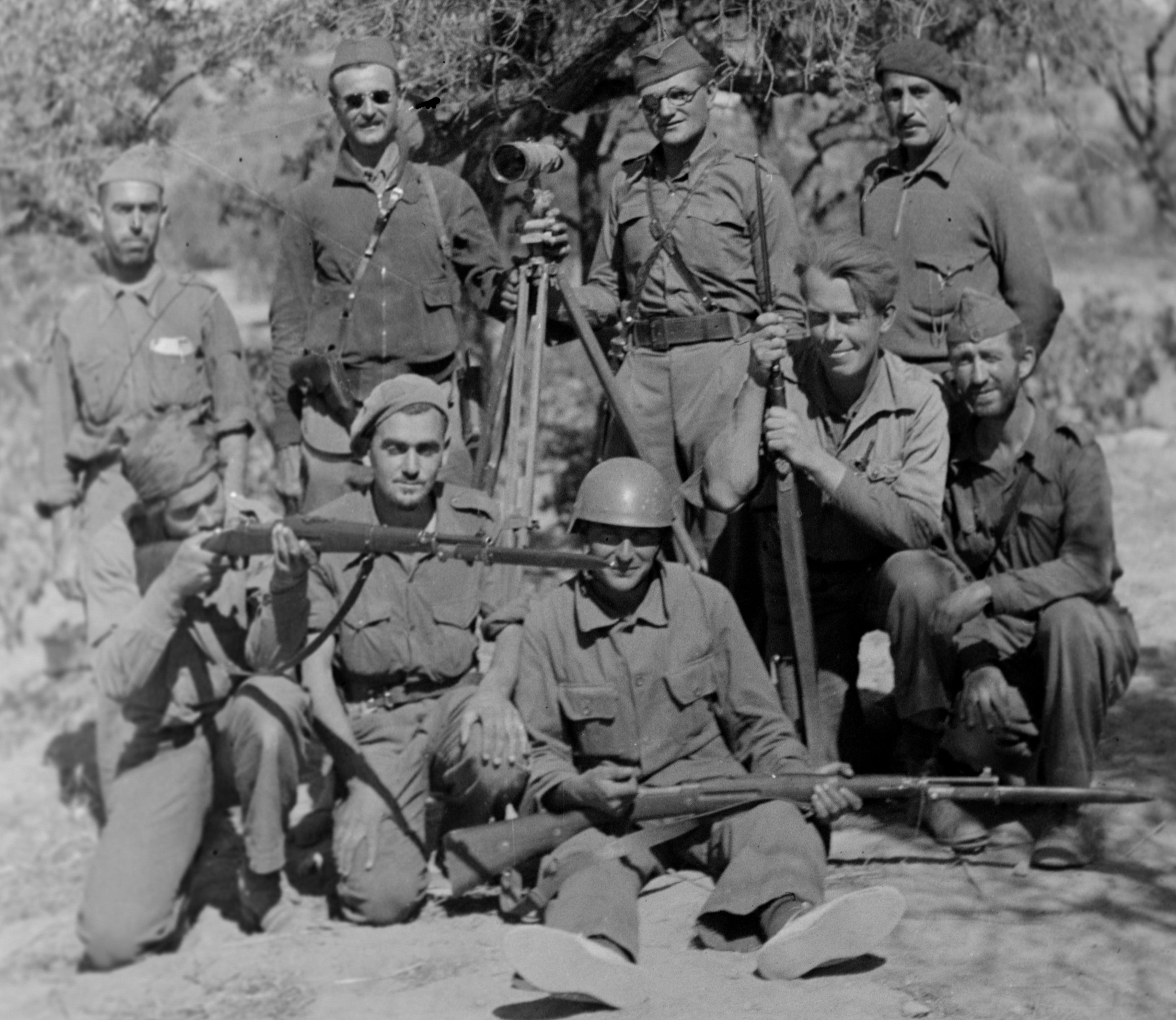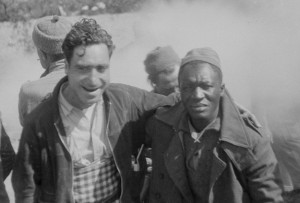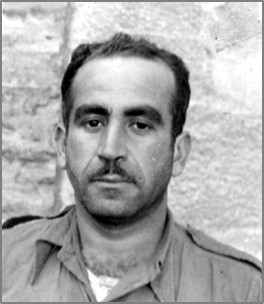Iraqi Volunteers in Spain
Among the 35,000 volunteers who traveled to Spain to support the Loyalist cause during the Spanish Civil War were two Iraqis. This is what we know about them.

15th International Brigade Observers, Ebro Front, (Nuri standing on the right) August 1938; Harry Randall: Fifteenth International Brigade Films and Photographs; ALBA PHOTO 011; 11-1076; Tamiment Library/Robert F. Wagner Labor Archives.
Baghdad-born Setty Abraham Horresh and Nuri Roufael Kotani, who served in the XVth International Brigade during the Spanish Civil War, grew up as part of oppressed minorities, Jewish and Christian respectively. Both groups experienced systematic discrimination against non-Muslims in their predominately Muslim country. Around the time Horresh and Kotani were born, the Ottoman Turks ruled Iraq; in 1917, the British conquest of Iraq briefly led to better living conditions for Jews and Christians in Iraq.
Setty was born on June 15, 1905, in Baghdad to Salik Setty and Rabeca Horresh. Setty’s family owned a business that manufactured rubber stamps. Very little is known about Setty’s early years. In the Biografía de Militantes he completed in April 1938, he noted no formal education or prior military service. He left Iraq in 1929, at the age of 24, for South America. He worked as an interpreter, typographer, and writer in Argentina from 1929-1934, then in Uruguay from 1934-1937.
In 1937, Setty travelled to Spain to join the International Brigades. At that time he was unmarried. After crossing the Pyrenees via the Massanet route, he arrived on December 2, 1937 and was recorded under the name “Setty Abraham” as an “Argentine” volunteer. After a brief training period with the XIIIth International Brigade he was transferred to the XVth International Brigade’s 59th Battalion and served in Company 3 and later Company 2 as an automatic-rifleman. Setty saw action during the Retreats from February 22, 1938 until April 15, 1938. After the Retreats he was he was transferred to the Brigade Auto Park as a driver, working with the unit along the Ebro River through May. There is no record of him from the Ebro Offensive through the withdrawal of the Internationals, nor is it clear where Setty went at the close of the war. He likely returned to South America.
Nuri Roufael Kotani was born on March 27, 1905, in Baghdad, in the district of Sababig Al-Al, to Rufael and Aliza (Eliis) Kotani, as the oldest of six children in a prominent Christian family. Nuri’s father placed great emphasis on educational development and enrolled Nuri in the Chaldean School in Baghdad beginning in 1912. He moved on to middle school in 1919 and completed his studies there in 1922. There were no secondary schools or colleges in Baghdad, so Nuri’s father sent him to the American University of Beirut, Syria (now Lebanon), where he studied from 1923 to 1930 and participated in an association that operated under the guise of a social club to support the Iraqi struggle against British occupation. In 1927, Nuri joined the Syrian Communist Party. He was active in party activities, including numerous trips into Palestine.
Nuri returned to Iraq in 1930, accepting a position teaching mathematics and physics in Baghdad. His education placed him among the highest ranks of the intelligentsia in Iraq. In 1931, he received a government scholarship to study engineering at the Massachusetts Institute of Technology (MIT) in Boston, Massachusetts. His deep involvement in left-wing activities may have contributed to his loss of the government scholarship in 1933. After leaving MIT, Nuri found a job with a Canadian railway where he worked for part of 1934 before returning to Baghdad and again accepting teaching positions.
After his return to Iraq, Nuri was elevated to the central committee of the Syrian Communist Party. Beginning in September 1935, he obtained a position with the Survey Department of Iraq as an assistant Engineer of Topography working for the railway department. In this role, Nuri actively recruited soldiers in Iraq, railway workers, artisans, students and among the revolutionary elements in Iraq. He also participated in the Movement for the Liberation of Palestine and was a founding member of the Association Against Imperialism and Fascism and the Committee for Combating Imperialism and Exploitation.
Nuri’s activities appear to have attracted the attention of the authorities. On November 29, 1935, he was detained and jailed. He did not go to trial, however, and was eventually released due to a lack of evidence. Nuri was forced to hide from the monarch’s secret police, making it difficult for him to hold a job.
It took more than a year for Nuri to obtain employment after his imprisonment. In February 1937, the Iraqi Railways hired him as an Assistant Engineer in the Survey Department. By April, he was forced to leave his job after receiving word that the police were planning to arrest him again. On November 1, 1937, he left Iraq, traveling by train to Syria and into Lebanon, where he boarded a ship to France. He ended his journey in Paris, where he lived with fellow Iraqi party member Yusif Ismael while arrangements were made for Nuri to cross into Spain.
Nuri arrived in Spain on February 10, 1938, over the Pyrenees via Massanet, under the name “Anwar R. Nouri” and was listed as an “American.” After less than a month of training in Tarazona Nuri was sent to the front on March 13, 1938, as a replacement for the XVth International Brigade’s Lincoln-Washington Battalion.

Setty and Mack Coad from Alabama,
Darmos, April 1938, Harry Randall:
Fifteenth International Brigade Films and
Photographs; ALBA PHOTO 011; 11-
034, Tamiment Library/Robert F. Wagner
Labor Archives
Nuri joined the XVth Brigade at the front during the battle the Republicans referred to as The Retreats. The Nationalist offensive was launched from the Teruel salient and eventually reached the sea, cutting Republican Spain in two. During the Retreats, the XVth Brigade was shattered, rebuilt, and shattered a second time. After arriving at the front, Nuri quickly transferred to the Observation Section in the Brigade Estado Mayor (Headquarter). Because he had experience in topography, he was appointed Chief of the Section. He served in the actions at Batea, Gandesa, and Mora de Ebro during the second phase of the Retreats and later led his section through the Ebro Offensive.
On June 1, 1938, Nuri was promoted to Cabo (Corporal). After the withdrawal of Internationals, on October 1, 1938, he was promoted further to Sargento (Sergeant). He planned to return to Bagdad but also indicated on his Biografía de Militantes form that he could go to Detroit, Michigan, where he had friends and relatives.
Nuri received a good report on the Communist Party evaluation conducted in Spain before the volunteers were repatriated. It noted that his general political attitude reflected “hard work and political clarity.” One of the form’s questions asked: What have you especially learned in the political or military fields since you have been in Spain, and what can you take back to the antifascist organization in your country? “In political field,” Nuri replied, “I came to understand how much people can struggle and sacrifice for their freedom and independence. In the military fields, I have never been a soldier before I can understand now the meaning of discipline, militancy order and mass cooperation.”
After leaving Spain Nuri was likely placed in a French concentration camp. He later told his family that it took four attempts before he was able to make it out. His escape was orchestrated by his friend Yusif Ismael, whose wife smuggled Nuri out hidden under the cargo load of a wagon. Nuri arrived in Paris and stayed with Yusif’s family. Having lost his identification papers and passport in Spain, he was forced to contact the Iraqi consulate. Fortunately, he encountered a friend and alumnus of the American University of Beirut, Ali Hayder Suleman, working in the Iraqi consulate in Paris. Ali provided Nuri with a new passport and funds that enabled him to return to Iraq. By November he was back.
In the years following, Nuri remained politically active. In August 1944, he married Najiba Noshi, the niece of a close friend from the American University in Beirut. Their marriage ended five years later. In 1956, he was arrested by order of the King of Iraq and sent to prison in the desert fortress of Samawah. He was not freed until after the July 14, 1958 Iraqi revolution. He became a railway minister in the progressive regime of Abd al-Karim Quasim but lost his post after the counterrevolutionary Ba’athists came into power in 1963. Nuri spent almost half of his life in prison or on the run from consequences related to his political beliefs. He died in 1980.
Chris Brooks, a longtime ALBA board member, maintains ALBA’s online biographical database of Lincoln Brigade veterans. For a fully sourced version of this article, see the ALBA Blog.
















Very nice story